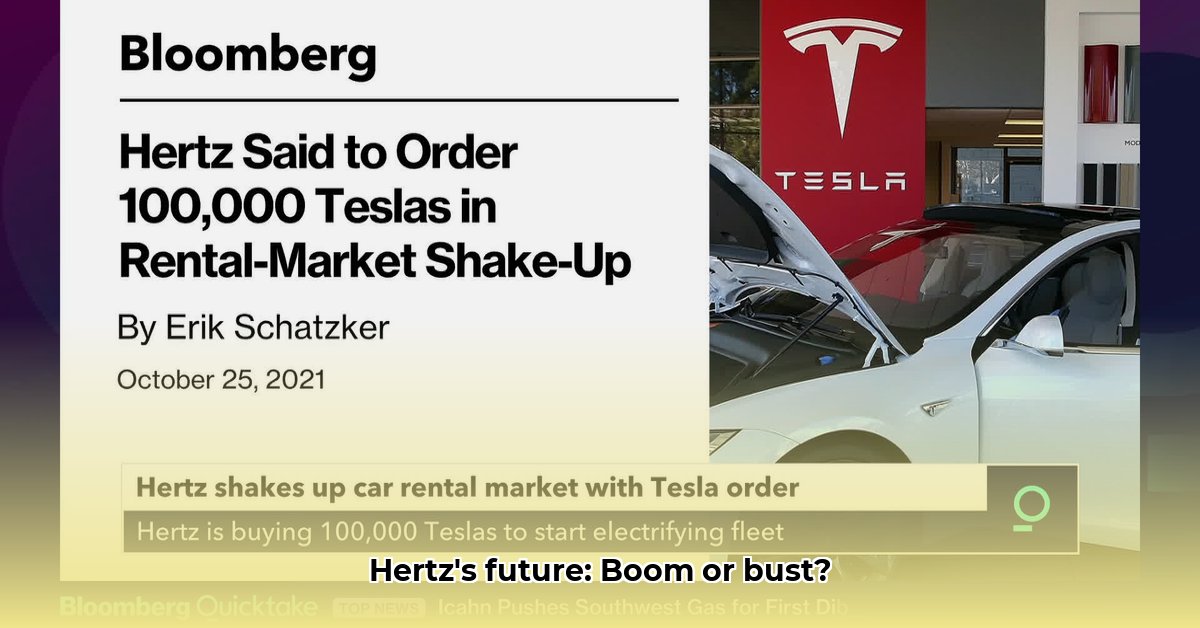
Hertz's Financial Performance: A Year of Contrasts
Hertz Global Holdings' financial picture in 2024 presents a complex narrative. While the company successfully emerged from Chapter 11 bankruptcy in 2021, its market capitalization has experienced significant volatility, raising questions about its long-term financial health. This fluctuation is intricately linked to the company's ambitious electric vehicle (EV) strategy and ongoing legal battles. Although revenue streams remain substantial, the heavy investment in EVs and related legal settlements have placed considerable strain on the company's balance sheet. A key metric to monitor is Hertz's debt-to-equity ratio, a critical indicator of financial stability. A high ratio signals increased risk. Essentially, Hertz is navigating a delicate balance between growth and solvency. How will they manage this?
The Electric Vehicle Strategy: A Double-Edged Sword
Hertz’s foray into the EV market initially appeared strategically astute, promising a competitive edge. However, the reality has been far more challenging. The resale value of used EVs has proven lower than projected, and repair costs, particularly battery replacements, have soared significantly exceeding those of gasoline-powered vehicles. This unexpected negative financial impact has prompted Hertz to curtail its EV expansion plans. Was this a necessary strategic retreat, or a sign of fundamental flaws in their EV strategy? The long-term implications remain uncertain. But was this necessary, or a sign of deeper strategic issues?
Legal Battles and Their Financial Impact
Adding to the financial pressure, Hertz has faced substantial legal costs stemming from settlements related to false theft claims. While necessary to resolve these issues, the settlements have significantly impacted the company's financial position, underscoring potential weaknesses in internal controls and risk management. Addressing and improving these internal processes is crucial for future financial stability. What steps is Hertz taking to prevent similar situations from arising?
Future Outlook: A Cautious Assessment
Predicting Hertz's future net worth remains difficult, given the dynamic interplay of factors. The company's substantial investment in EVs hasn't yielded the anticipated financial returns, and high legal costs continue to impact profitability. However, Hertz remains a major player with a strong brand recognition in the car rental industry. The road ahead isn't devoid of opportunities. Continued success hingeson navigating the EV transition, improving risk management, and regaining investor confidence. Failure to do so could have severe repercussions for the company's financial health.
Key Financial Indicators (2024 Estimates)
While precise figures await official financial statements, available data suggests the following estimations for Hertz's 2024 performance:
- Revenue: Estimated at approximately $7 billion USD (this is a broad estimation and subject to market fluctuations).
- Market Capitalization: Estimates currently exceed $1 billion USD, but this figure has shown considerable volatility throughout the year.
- Debt-to-Equity Ratio: To be determined upon release of official financial statements. This ratio is extremely important for evaluating the company's long-term financial health.
- Net Income (or Loss): To be determined, largely contingent upon the success of the EV strategy and the resolution of remaining legal issues.
Disclaimer: The above figures are estimates and should not be interpreted as precise financial statements. These values are subject to change upon the release of Hertz's official financial data.
Key Questions Facing Hertz
- EV Profitability: Can Hertz develop a profitable model for its EV fleet, effectively mitigating high repair costs and maximizing utilization rates?
- Risk Management: How will Hertz improve its risk management systems to prevent future legal challenges and control operational costs?
- Investor Confidence: Will Hertz be able to restore investor confidence and attract future capital investments?
- Industry Adaptation: How effectively can Hertz adapt to the rapidly evolving automotive landscape?
The answers to these critical questions will significantly influence Hertz's financial trajectory and determine its long-term net worth. The company's ability to address these challenges will ultimately shape its future success.